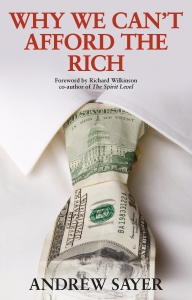Against the backdrop of rising economic inequality, Why We Can’t Afford the Rich tackles the myth that the rich are vital wealth creators. Instead, Andrew Sayer outlines the negative societal and environmental impact of unsustainable growth and extreme concentrations of wealth. Winner of the 2015 British Academy Peter Townsend Prize, this is a readable and persuasive book, even if some of its recommendations will be familiar to readers of other recent, popular analyses of inequality, austerity and the financial crisis, writes Dan McArthur.
If you are interested in this review, you may also like to read Andrew Sayer’s post from January 2015.
Why We Can’t Afford the Rich. Revised ed. Andrew Sayer. Policy Press. 2015.
 The last thirty years have witnessed huge increases in the income and wealth of the very richest, and more recently poverty and hardship resulting from the economic crisis of 2008 and the austerity policies that followed it. This situation has made economic inequality one of the defining academic, political and policy issues of our time. Several books, especially Thomas Piketty’s bestseller Capital in the Twenty-First Century and Richard Wilkinson and Kate Pickett’s The Spirit Level: Why More Equal Societies Almost Always Do Better, have very successfully brought academic debates about the causes, effects and possible cures of and for economic inequality to a non-academic audience. It is in this crowded market that Andrew Sayer’s Why We Can’t Afford the Rich appears.
The last thirty years have witnessed huge increases in the income and wealth of the very richest, and more recently poverty and hardship resulting from the economic crisis of 2008 and the austerity policies that followed it. This situation has made economic inequality one of the defining academic, political and policy issues of our time. Several books, especially Thomas Piketty’s bestseller Capital in the Twenty-First Century and Richard Wilkinson and Kate Pickett’s The Spirit Level: Why More Equal Societies Almost Always Do Better, have very successfully brought academic debates about the causes, effects and possible cures of and for economic inequality to a non-academic audience. It is in this crowded market that Andrew Sayer’s Why We Can’t Afford the Rich appears.
Sayer is a well-known sociologist and radical thinker based at the University of Lancaster. His research straddles political philosophy and empirical social science, and the ability to blend moral argument with empirical evidence is a key strength of the book. The fundamental claim of Why We Can’t Afford The Rich is that extreme concentrations of wealth are not only unjust, but also reduce the resources available for the less-well off and seriously damage democracy and the environment. In doing so, the book covers a huge amount of ground in a highly accessible manner.
The early sections of the book set out Sayer’s most interesting arguments: namely, that the wealth of the rich is unearned, and thus amounts to the extraction of value created by others or else simply speculation. His approach is an updated version of Marxist economic thought and differs fundamentally from the starting assumptions of mainstream economics.
For Sayer, economics is about ‘provisioning’: ‘how societies provide themselves with the wherewithal to live’ (20). This involves the production of food and commodities as well as caring for and educating others, and can take place within the market as well as outside of it. From this perspective there is a difference between the usefulness of goods or services (use value) and their market price (exchange value). There is a difference between performing labour that genuinely improves people’s lives and the unproductive income generated from monopolising a scarce resource. Thus, income that comes from work which produces use value is earned, and income that is either produced without working or by work which does not produce use value is unearned.
 Image Credit: Tax Credits
Image Credit: Tax Credits
Sayer spends the first half of the book establishing his claim that the rich owe the majority of their wealth to unearned income. This happens in a number of different ways. Firstly, the rich derive a significant part of their wealth from their ability to monopolise scarce resources. The most important of these is land, with many of the very rich owing their affluence to huge investments in the property market. Wealth derived from such sources is unproductive because it does not create use value: it is simply an arrangement of property rights which allows some to profit from their ownership of scarce assets. Similarly, hedge funds or investment banks in which the very wealthy invest their money often speculate on commodity prices or use financial products such as derivatives, which are essentially methods of ‘value-skimming’.
Sayer discusses a second source of unearned income for the rich under the heading of ‘usury’. The economic institution of interest rates, and especially compound interest, interacts with existing distributions of wealth to essentially redistribute wealth to the already well off. In Britain only those in the top one per cent of income distribution make more in interest on their savings than they pay out in interest on debts (69). Sayer sees wealth from lending money when high rates of interest are charged as fundamentally unearned, because the rich are simply taking advantage of an unequal power relationship between themselves and the less well off.
Thirdly, the income of the rich is unearned even if they invest in corporations which create useful goods or services because they are profiting from the labour of the people who actually do the work. Sayer argues that share portfolios are too diversified and change too frequently for shareholders to have any positive role in running the companies they own: they are typically simply speculating on movements in share prices. As a result, the majority of the income that shareholders receive is simply the result of property relations that allow them to extract the earned income of workers.
Sayer does well in considering possible counter-arguments to his propositions, such as the claim that the rich create jobs. Furthermore, despite his Marxist background, the book is not a critique of capitalism or markets in general. Rather, he argues that the specific institutions of contemporary ‘neo-liberal’ capitalism generate unjust and socially damaging inequalities. In sum, this section of the book presents an accessible and compelling argument for the idea that the wealth of the very rich is generally unearned and undeserved – a function of unequal property rights and power relations.
Later sections of the book cover the negative effects of inequality on the political process and the environment. Sayer discusses how the very rich use lobbying, political party donations and the ‘revolving door’ to reward cooperative regulators and politicians. These are important issues, and their inclusion is perhaps a necessary complement to the previous sections of the book. However, some readers may feel that they have heard many of the examples before, and the level of the analysis is less detailed than in previous sections of the book. Similarly, Sayer’s concluding policy recommendations – increased taxes on property, financial transactions and wealth in general, greater employee ownership of businesses and greater regulation of the financial sector – are sensible and consistent with the analysis he presents, but likely to already be familiar to readers of popular academic and journalistic work on inequality.
So what does this book offer that other popular analyses of inequality, austerity and the financial crisis do not? The value of Sayer’s account lies in his readable and persuasive attack on the idea that the very richest have accumulated their wealth fairly and deserve to be allowed to accumulate more.
Dan McArthur is a PhD student in the LSE Department of Sociology and the LSE International Inequalities Institute. His research investigates the relationship between economic inequality and the stigmatisation of people in poverty in public opinion. Dan holds an MSc in Sociology from LSE, and a BA in Philosophy, Politics and Economics from the University of Oxford. His broader academic interests include the study of social class, comparative political economy, the philosophy of social science and sociological debates about immigration and multiculturalism. Read more reviews by Dan McArthur.
Note: This review gives the views of the author, and not the position of the LSE Review of Books blog, or of the London School of Economics.








3 Comments